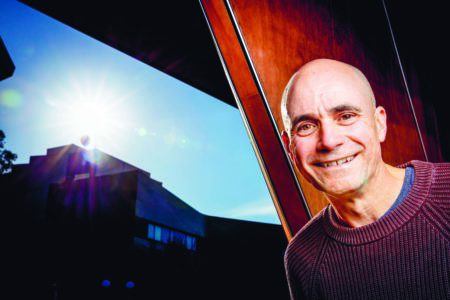Everyone runs for a reason. Get fit, lose weight, clear the head but, for some, the benefits of running extend to providing sustenance for the soul – a chance to connect with your inner self and also with God.
By Stephen Acott and Mikaela Turner
The first time Rev Nigel Hanscamp went for a run he lasted 300m.
Next day, he tried again and tripled the distance. Five weeks later he was running 5km, which is all the more impressive when you consider the popular Couch to 5km program takes nine weeks.
Nigel now runs six days a week, totalling about 75km. He’s in training for a 100km run in September and … wait for it … he’s looking forward to it.
“I can’t wait,” he says.
Nigel, it goes without saying, is not like the rest of us. He’s been bitten by the running bug and the symptoms are there for all to see: nine marathons (42km) and four ultra-marathons (up to 56km) in the past 10 years (three of those in 2019) – that’s the equivalent of running from Melbourne to Canberra.
Nigel wasn’t always like this, however, as his first run would indicate. Back in 2010, Nigel wasn’t exercising at all and if it wasn’t for the fact his father suffered a heart attack, he may never have used his runners for anything other than the occasional walk.
But there’s nothing like mortality staring you in the face to make you sit up and ask yourself a few hard questions.
“I remember walking through the hospital car park thinking ‘I can’t end up like that, I have to do something, I have to start running’,” Nigel, 54, says.
At the time Nigel weighed 96kg, which included the stereotypical spare tyre around his waist. These days he’s a very lean 77kg, even with a beard.
Nigel may be different, but he’s not alone. About three million Australians consider themselves “runners” and the number is increasing as more and more people focus on their physical health.
Physical well-being isn’t the only byproduct of running, however. There are scientifically-proven mental benefits and enough anecdotal evidence to suggest the perks extend beyond the mind and body and inhabit the spiritual, the soul. And you don’t need to be religious to tap into it.
Kelly Linaker is an example. The 43-year-old triathlete describes herself as “non-religious” yet revels in what she calls the “spirituality” of her regular runs.
“Our world is so 24/7, there is just so much information coming in and so much required of us being attached to devices constantly,” she says.
“We’re accessible at all times so, for me, I get pure enjoyment in being able to go into the bush with no phone and just run. The freedom and the fresh air, it refreshes and resets you and you just come back feeling better. That’s my spirituality of it – I get to disconnect from the world and it’s something I do purely for my own enjoyment.”
Nigel, who lives at Wandin North, is part of a running group called the Knox Road Runners (based in Bayswater), of which he is one of the few “religious” people. He says for his fellow runners, spirituality transcends religion and is something they are all cognisant of as they crank out the kilometres.
“Most people I talk to about spirituality who are not religious say ‘spirituality is something that’s internal and personal, something that happens in me and for me’,” he says.
“For runners, it’s often the ‘runners high’ – those transcendent moments when you’re completely in the zone and you’re not thinking about the way your body is working.”
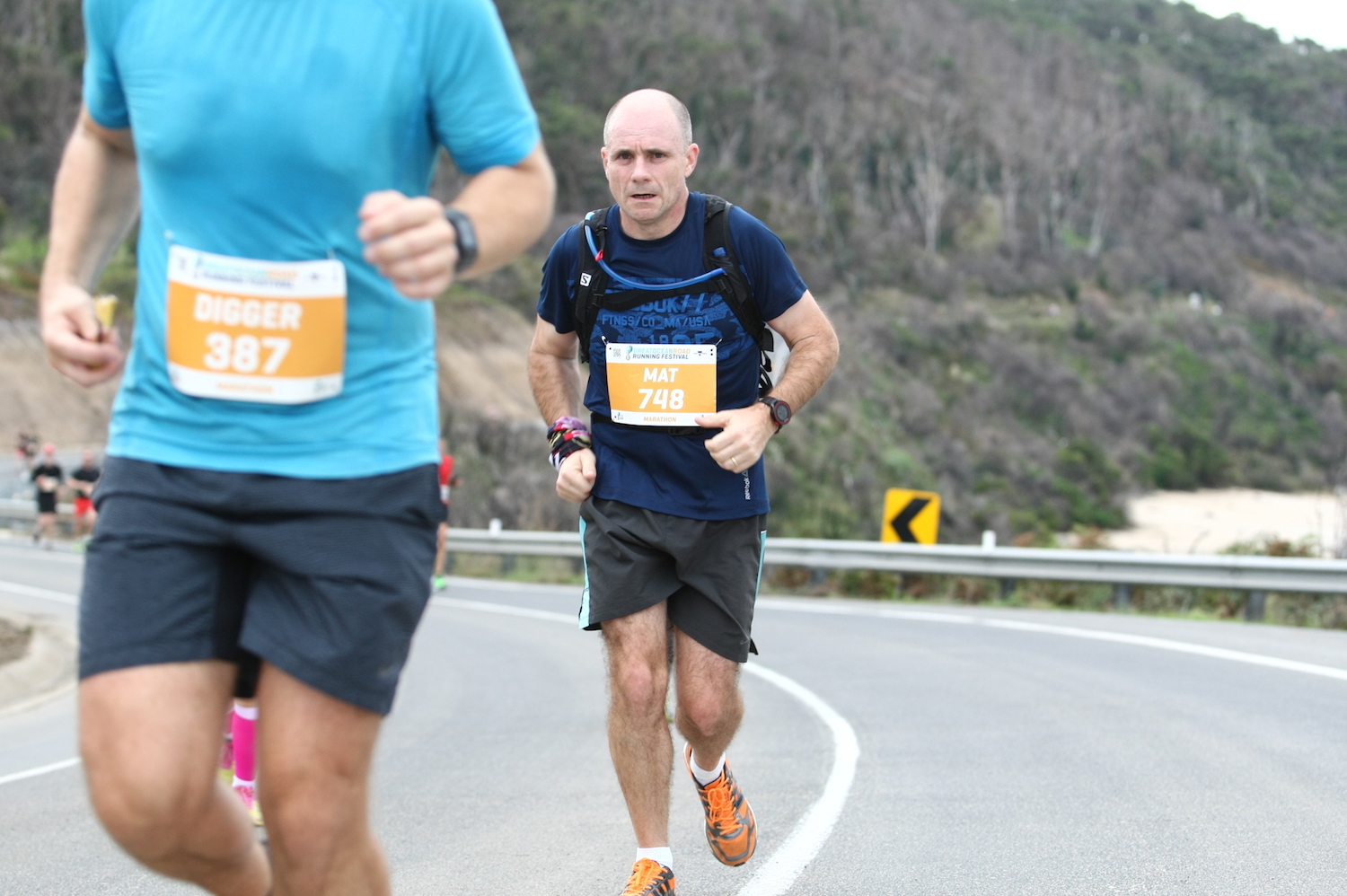
Mat Harry completes the Great Ocean Rd Marathon in 2017. He ran the final 16km with a badly injured knee.
Rev Mat Harry, 48, says he’s always been in reasonable shape, but 10 years ago, a friend invited he and his wife to join her on the Couch to 5km challenge. He says he managed a “gentle jog” for about five minutes on the first day of training and hasn’t looked back since.
These days, he and his wife will think nothing of going on a 20km run “just to do something productive”.
Mat, who lives at Narre Warren, says one of the things he most looks forward to when he hits the nature trail is “being in creation” and the affinity with God that inspires.
“I feel more connected with God out in creation and the way I like to be out in creation now is to be running,” he says.
“Part of the spiritual aspect of running is the next step. Part of my makeup is always wanting to push the boundaries and running is a way I can push the boundaries of who God has created me to be.”
Mat says he’s completed three marathons in the past three years and “four or five half marathons a year”. It wasn’t meant to be like this, however. Another victim of the running bug, Mat says he used to look at long-distance runners and shake his head.
“In the early days I remember going for a run around Lysterfield Lake (about 6km) and there’d be people running along carrying their own water,” he says.
“I said to (wife) Susan ‘if I ever get the point where I am wanting to run distances long enough to need to carry my own water, take me aside and give me a stern talking to because I’ve lost my mind’. So, of course, now I’m always running with a backpack. That’s just an illustration of the transformation that happened in terms of my attitude towards it.”
Like most things in life, the Bible has a thing or two to say about running. There’s 1 Corinthians 9:24-25: “Do you not know that in a race all the runners run, but only one gets the prize? Run in such a way as to get the prize. Everyone who competes in the games goes into strict training. They do it to get a crown that will not last, but we do it to get a crown that will last forever.”
And there’s Hebrews 12:11. “No discipline seems pleasant at the time, but painful. Later on, however, it produces a harvest of righteousness and peace for those who have been trained by it.” In other words, no pain, no gain.
Mat didn’t have Hebrews buzzing about his brain when he lined up for the Great Ocean Rd Marathon (Lorne to Apollo Bay) in 2017, but it may have come in handy when he hit the 28km mark.
If you’ve reached this far and are still not convinced runners are a breed apart, then let Mat tell you about his GORM experience.
Before he begins, it’s worth noting he goes into the race – all 44km of it – with a dicky knee, specifically Ilitotibial Band Syndrome. He could have decided to do the half-marathon instead (23km), or the Paradise Run (14km), or even the Mizuno Murengo Run (6km), but, no, that would have been sensible. And Mat’s a runner. He’s different. Sensible is for someone else.
As Mat waits for the race to start, he knows it’s not a case of if he’ll find himself in pain, but when. And not your garden variety knee pain, but excruciating, intolerable, untreatable agony. And it’s not like you don’t need your knees if you’re running a marathon. They’re an essential item.
Anyway, as Mat completes the first 27km he’s feeling OK, all things considered. But when he gets to the 28km mark his leg seizes. And he still has 16km to go.
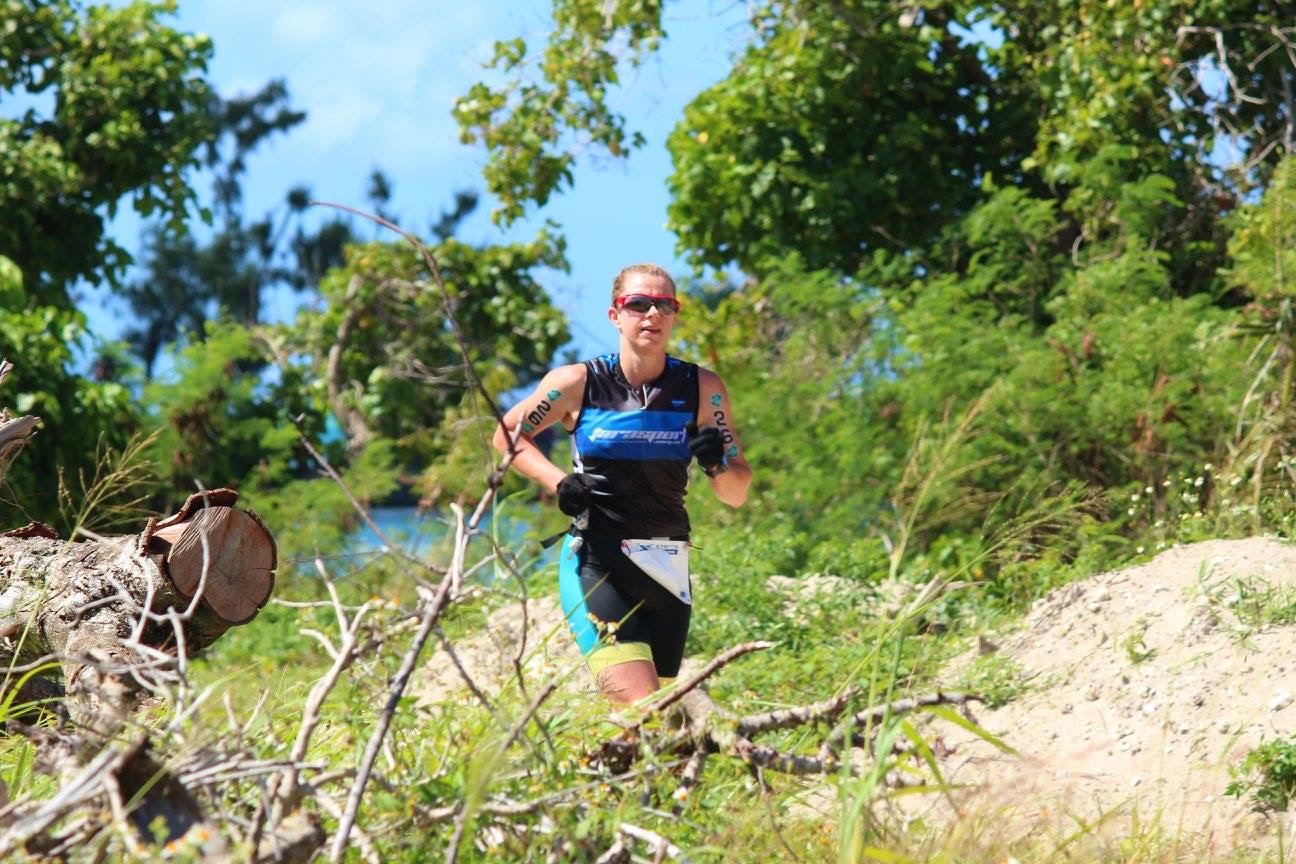
Kelly Linaker: “I get to disconnect from the world and it’s something I do purely for my own enjoyment.”
“I’m in agony, like nothing I’ve ever experienced,” Mat says. “But I was determined to push through the pain.”
Of course he was. He’s a runner. What was it Hebrews said again? Something about a “harvest of righteousness and peace”. That doesn’t seem imminent right now.
The way Mat tells it, he had to push on. He knew he had ITBS, he knew this moment was coming so, because he’s a runner and his head isn’t screwed on straight, he thinks “I’ve got no excuse”.
Yes you do, Mat. Your leg feels like it wants to detach itself from the rest of your body. You. Can. Just. Stop. And. Get. It. Treated. Hell, you could even take a painkiller. But no. Mat had been to the physio four weeks earlier and was told he couldn’t do any more damage. “I was only going to be in pain,” Mat says. In other words, it was just a flesh wound.
“So I thought ‘I’ve just got to keep going’. So I kept going for the remaining 16km and when I crossed the line I couldn’t do anything but cry for 15 minutes. I was in that much pain.
“It took me six months to recover mentally. I was mentally scarred from the pain. I had no joy or enthusiasm for running. But then, one day, I went for a 5km park run and Igot to the end and said ‘I want to sign up for my next marathon’. I can’t explain it.”
Maybe Nigel can. We ask him to talk us through one of his recreational runs. It’s worth pointing out that, for Nigel, a “recreational run” is anywhere from two-and-a-half-hours to three.
Anyway, over to you, Nigel.
“The alarm goes off at 5.30am,” he begins. “Getting out of bed can be difficult, but I grab a coffee, pack my bag with fuel (electrolytes and water), do some stretches and am out the door at 6.30am.
“I’m looking forward to hitting the trail, the sights and smells – and I really enjoy the sunrise. I’m going on a three- hour run. After nine years of running I’m no longer thinking about the tiredness for the first part of it, I’m thinking about the joy that comes after the run.
“For the first part of it, I’m running slightly uphill, then I get to a fairly steep short hill and I’m feeling for the burn on my legs to know if I can push it a little more, because if I push it too much I’m going to struggle at the end of the run. Soon after that hill, I’m stretching out my stride and my body gets into the flow and I’m able to lift my head up and look at what’s happening in the bush around me. I’m looking out for wallabies and echidnas or whatever is around.
“Further along I get to a stream and, as I cross it, I look down it to see what’s there. If I see something interesting I might stop, pull my phone out and take a photo. I usually post about 10 photos at the end of each run.
“About an hour into the run I refuel. Further on, I come across a place where there are sometimes lyrebirds. If they are there I might stop and video them. At about the halfway point I start to pick up the pace and decide which way I’m going to go back home.
“One way involves a 100m stretch where I’ll be ankle-deep in mud, there’s no getting around it, you just have to run through it. Eventually, I get to the last 4km downhill so I pick up the pace. If I’m feeling good I’ll pick it up even more and just enjoy the feeling of going downhill. Just before I get home there’s another uphill section.
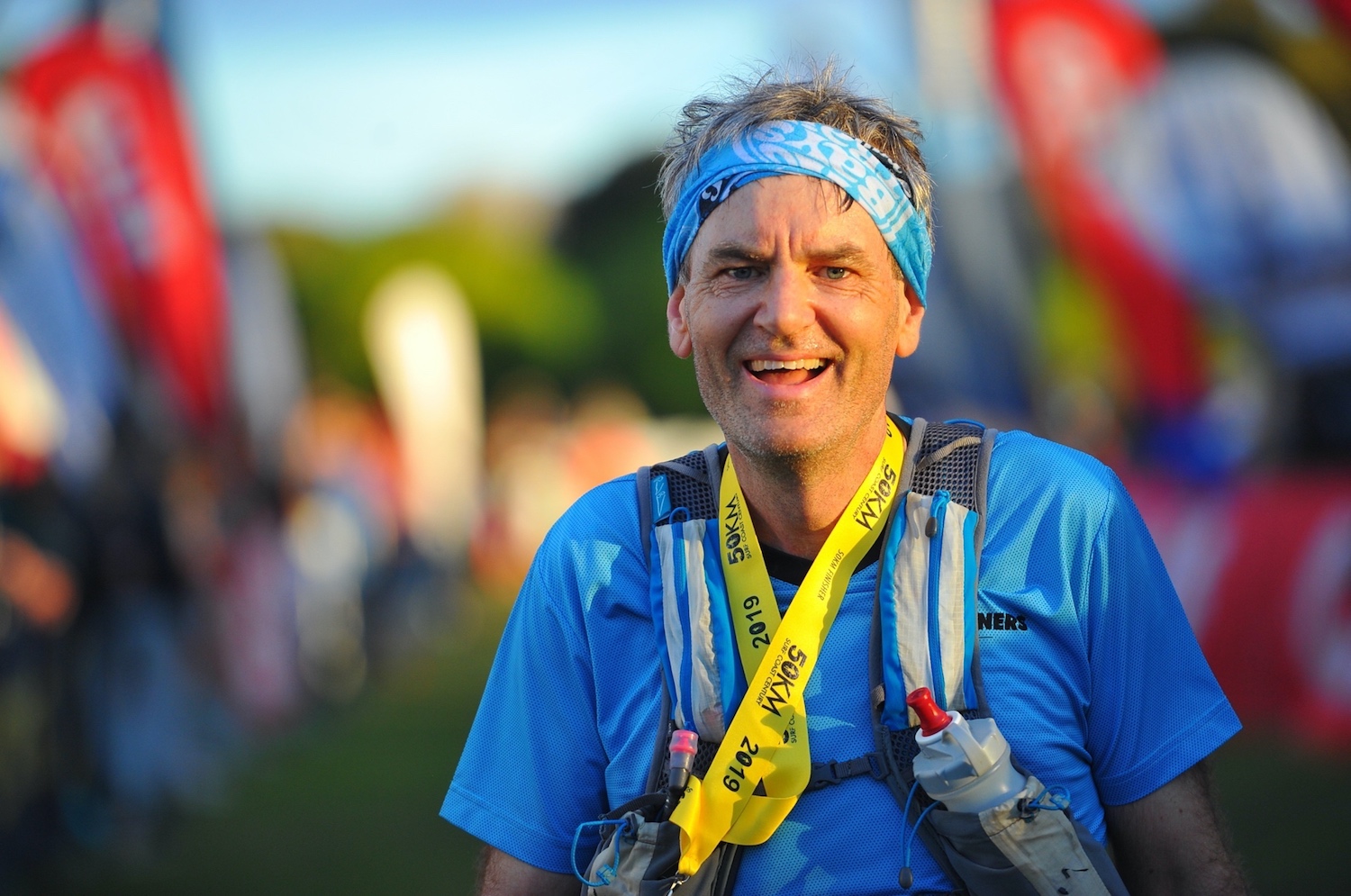
Rev Nigel Hanscamp at the finishing line of the Surf Coast Century where he competed in the 50km race.
“The mental battle comes after the first hour or so, but I try to focus on the positives – the fact I’m out here when no one else is. The body does what the brain tells it to.”
The flora, fauna and sunrise are just three of the factors that get Nigel out of bed at 5.30am. The other driving motivation is the inevitable spiritual experience that awaits him on the less taxing parts of the run.
“There’s no distraction, no television, no Facebook, you’re having to explore scenarios and process where you’re at and what’s going on in your life,” he says.
“By listening to your own breathing, you’re able to get into almost a trance. It has that meditative thing where you get into a pattern of doing something enough to be able to not focus on it.
“Sometimes I’ll pray, just think through situations with God. Then there’s the connection with nature.”
Most people see running as an individual pursuit. It’s you – your legs, your lungs, your grit – versus the finish line. As author Michael D’Aulerio put it: “It’s not the distance you must conquer in running, it’s yourself.”
But there’s an unmistakable camaraderie, kinship even, among runners, particularly those that gather regularly to run and reflect.
Kelly says when she’s on a run with someone else a sense of trust soon develops.
“You have this shared sense of something with somebody that’s so pure and something not everybody gets to experience, so when you’re out there and you’re separated from your life and you feel comfortable and trusting, you can just divulge whatever it is that’s going on,” she says.
“You never expect to go into that run and talk to your running buddy, or even someone you don’t know that well, and share something personal, but I think you just find a connection. If someone helps you through a huge physical challenge, it can definitely translate into a mental sense as well.”
Nigel says the Knox Road Runners is a very tight group and its weekly runs can sometimes resemble a group counselling session.
“A running community is much more than random strangers getting together to run occasionally,” he says. “You get to know each other’s stories, weaknesses, strengths and you connect with people who have so much wisdom and experience.
“Recently, I was running with a guy who told me about his business going under and having to walk away with $100,000 of debt. When I saw him again two weeks later there was a look exchange, a recognition that we’d been through something together.
“Another time I was running with two women and they both shared their similar experiences of domestic violence and at the end one of them said ‘I don’t think we’ve ever actually talked about that with each other’.
“There are moments when, because of the physical difficulty, you’re far more vulnerable, you’re having to admit it hurts, but the companionship enables you to get through and that builds a level of trust.
“There are people who rely on these running groups for their mental health.”
Runner, Christian, blogger and “lover of all things outdoors” Michael Fitzgerald has written extensively on the relationship he’s formed with running and religion.
He says over the years he’s “picked up a lot of obvious health benefits from running” but also gained some “not-so-obvious spiritual benefits”. In one of his posts he lists five things he’s learned from running that have helped him “go deeper spiritually”.
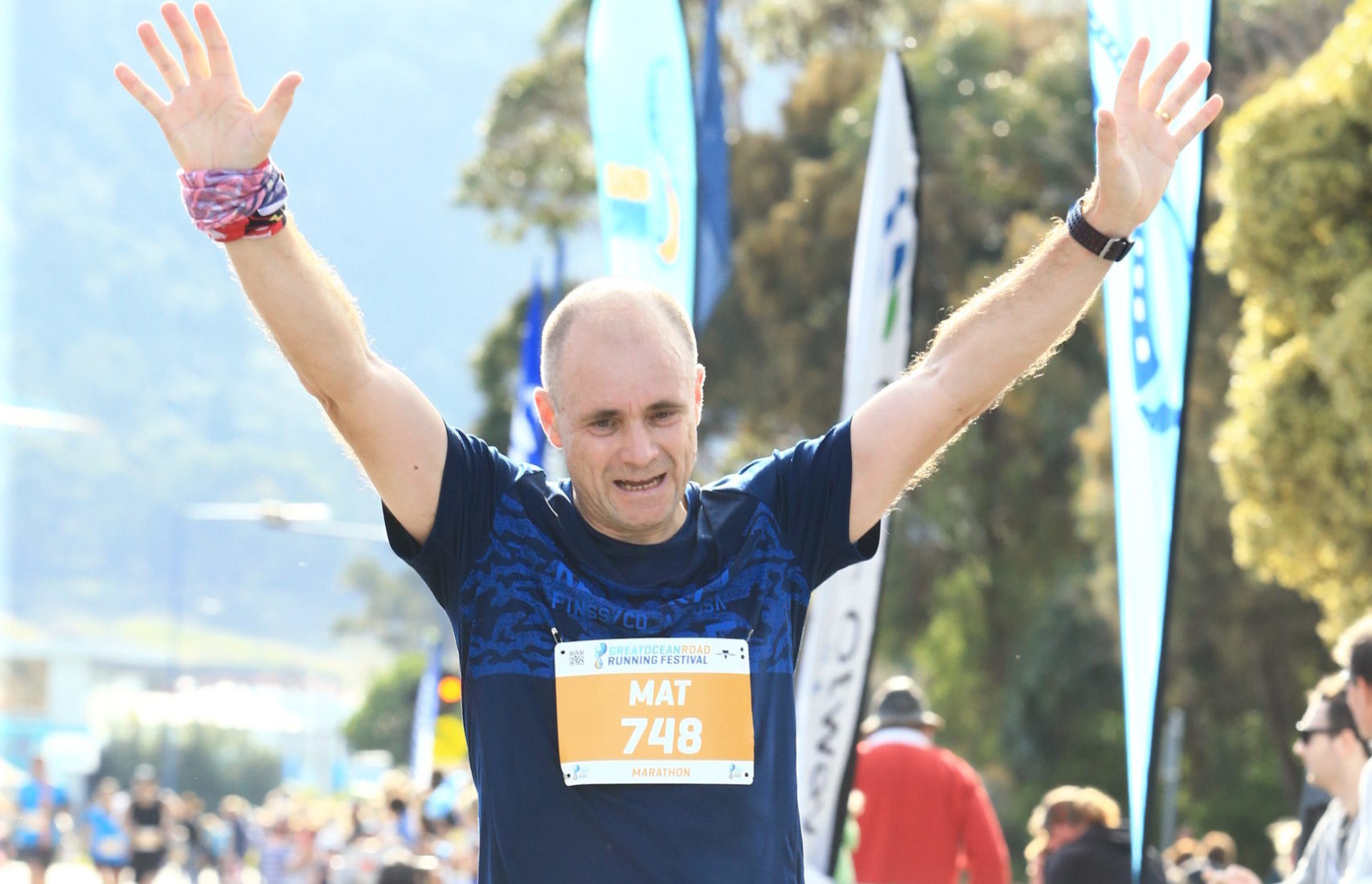
Rev Mat Harry finishes the Great Ocean Road marathon.
“1. Running helps me believe in myself. I’ve been dancing with a dodgy disease for over a decade, so when I first got started, running a competitive race seemed only remotely possible. But I’ve run 11 races since I started running again. I’m staring that disease down every day, challenging it with faith in myself and in the resilience of my body. And it’s working.
“2. Running helps me believe in something bigger than myself. Left to its own devices, your body will always want the shortcut. But you are more than your body. There is something infinite inside of you that longs to express itself. Turn off the greed gland and you’ll be able to reach for something higher.
“3. Running heals me. After a few weeks of getting on my feet and peeling the mattress off my back, my body chemistry changed. My body longed to get out and run and started reminding me to do that often. It liked my lower blood pressure, the lost pounds, and the regular endorphin high. And when I really listened to it, my body steered me toward real food, not the imitation stuff. I’ve started to heal and it feels good.
“4. Running amps up my meditation. Lots of runners like to listen to music when they run, but I rarely do. I’ve found my thinking is more clear when I’m running than at any other time, and I’m more open to new ways of looking at the world. I listen to my body and to my inner self. I sort through problems and discover solutions. Almost without fail, I come back home with a feeling of peace and a better sense of balance and well-being.
“5. Running inspires me to worship. I’ve gotten in the habit of offering a lot of thanks when I’m running. As I take in the beauty of the world and the miracle of the human body, I can’t hold back the sincere, overwhelming sense of gratitude I have for God’s gifts. Running time is a time I feel connected my Higher Power. With new spring in my feet, I feel a oneness with heaven. It’s helped me come face-to-face with who I really am, and the better I know my true self, the closer I feel to God.
“Running, to me, is more of a spiritual practice than a physical one. It has taken me places I didn’t think I could ever go again. It’s a path of peace I won’t be stepping off soon.”
Maybe runners aren’t so different after all. Maybe we could learn a thing or two from them. Maybe, if we’re really honest with ourselves, they have something
to envy. After all, we’re all on a spiritual journey and they seem to have unlocked a shortcut. And, as Nigel discovered a decade ago, that shortcut can be as little as 300m.
This article originally appeared in the June edition of Crosslight. To read the full magazine, click here.


